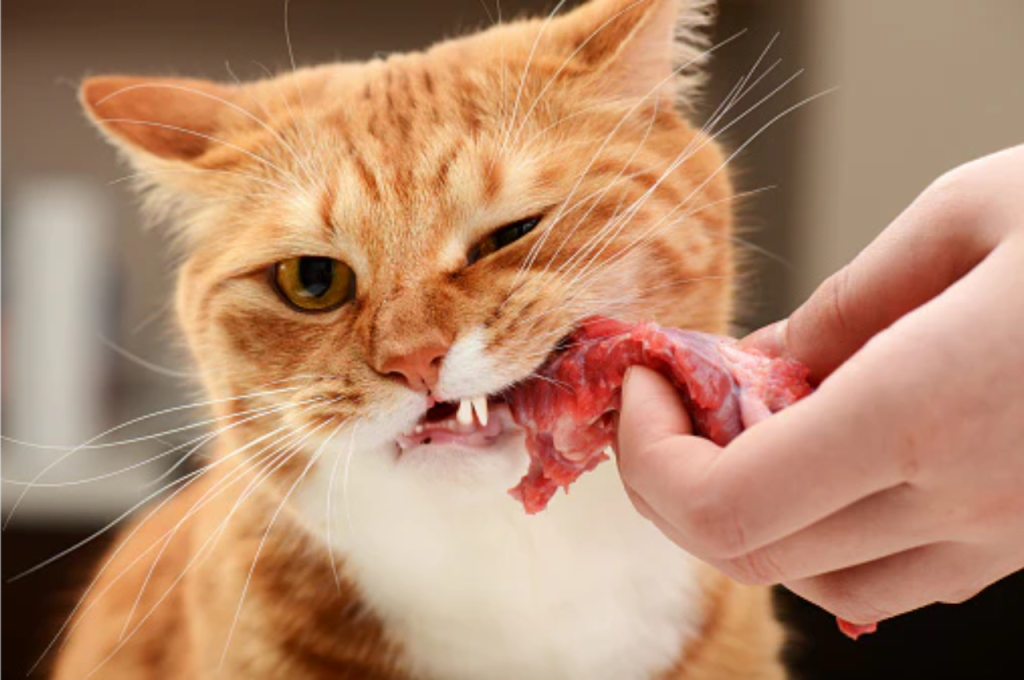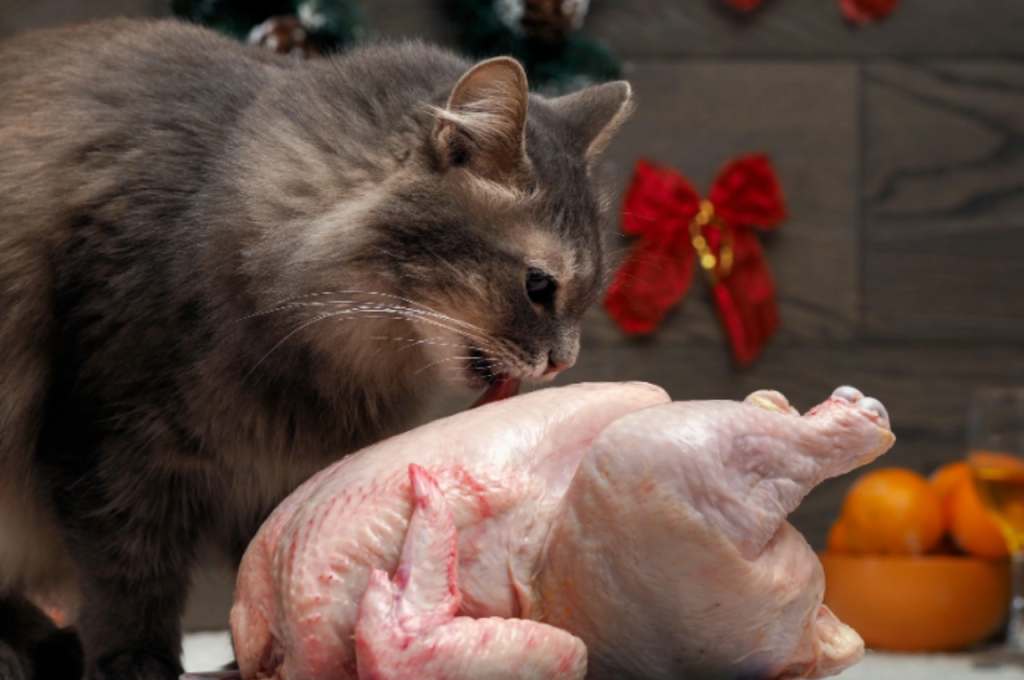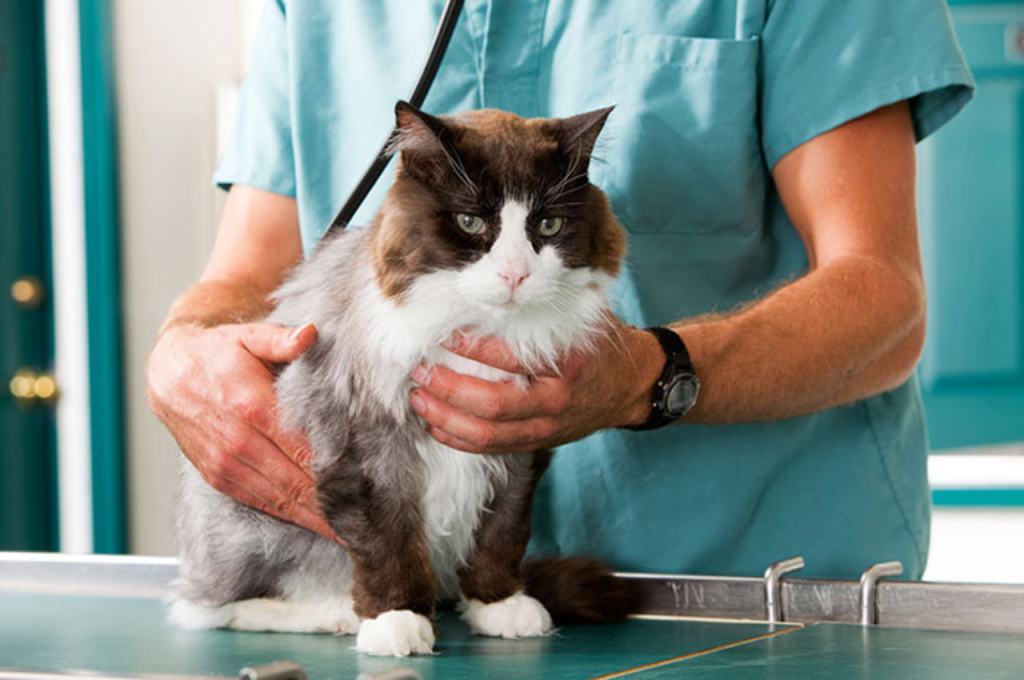The healthiest meat for cats is lean poultry like chicken or turkey due to its high protein content. Rich in essential nutrients, these meats promote overall feline health and support muscle growth.
When selecting meat for your cat, opt for high-quality, lean cuts to ensure a balanced diet that meets their nutritional needs. In addition to poultry, pork, and lean beef can also be included in moderation, providing variety and additional nutrients to keep your cat healthy and satisfied.
It’s essential to consult with your veterinarian to determine the best meat options based on your cat’s individual dietary requirements and health conditions.
The Importance of Meat in Cats’ Diet
Cats are obligate carnivores, meaning their diet must primarily consist of meat for optimal health. This diet ensures they receive essential nutrients like protein, taurine, and vitamins that are vital for their overall well-being.

Carnivorous Nature of Cats
Cats have an instinct to feed on meat due to their predatory nature. Providing a diet rich in meat-based protein is essential for meeting their nutritional requirements and ensuring their overall health and well-being.
Nutritional Requirements of Cats
Cats require specific nutrients found in meat for their overall well-being and vitality. As obligate carnivores, their bodies are adapted to efficiently digest and utilize the protein, vitamins, and minerals abundant in meat-based diets.
Health Benefits of Meat for Cats
When it comes to the health of your feline friend, providing them with the healthiest meat is crucial. Cats are obligate carnivores, meaning that they require meat in their diet to meet their nutritional needs. Incorporating the right kind of meat in their diet not only satisfies their instincts but also offers numerous health benefits.
Provides Essential Nutrients
Meat is a rich source of essential nutrients for cats. It provides high-quality protein, which is necessary for the growth and maintenance of lean muscle mass, as well as for supporting a healthy immune system. Additionally, meat contains essential amino acids and vitamins, such as vitamin B12 and vitamin A, which are crucial for overall feline health.
Supports Muscle Development
The protein found in meat supports muscle development in cats. Their bodies rely on protein to maintain muscle mass, and meat provides a bioavailable source of amino acids. This is essential for growing kittens and senior cats alike, as it helps them stay active and maintain their strength throughout their life.
Factors to Consider in Choosing Healthy Meat for Cats
When choosing healthy meat for your cat’s diet, several factors should be considered to ensure it meets their nutritional needs and supports their overall health:
Quality of Protein
One crucial factor to consider when choosing healthy meat for cats is the quality of protein it provides. Cats are obligate carnivores, which means their bodies are designed to derive essential nutrients primarily from animal sources. Therefore, a diet high in quality protein is vital for their overall health and well-being.
When selecting meat for your feline companion, opt for lean meats that are rich in high-quality protein. These can include chicken, turkey, rabbit, and fish.
Tips: Look for meat labeled as “human-grade” or “fit for human consumption”. These meats undergo strict quality control standards, ensuring that they are safe and nutritious for your cat.
Absence of Additives or Fillers
In addition to the quality of protein, it is crucial to consider the absence of additives or fillers in the meat you choose for your cat. Additives and fillers, such as artificial flavors, colors, and preservatives, can potentially lead to health issues in cats.
When examining the label of meat products, ensure that they do not contain by-products or artificial additives. By-products are lower-quality meat products that may contain organs, bones, and other parts of the animal that are less nutritionally dense.
Opt for meat options with a clear list of ingredients, free of artificial additives or fillers. Consider looking for organic or raw meat options to provide the most natural and nutrient-rich diet for your cat.
| Factors to Consider | Meat Recommendations |
| Quality of Protein | Chicken, turkey, rabbit, fish |
| Absence of Additives or Fillers | Meat labeled as “human-grade” or “fit for human consumption”; free of by-products and artificial additives |
Comparison of Different Types of Meat for Cats
When it comes to choosing the healthiest meat for your cat, it is important to consider the nutritional benefits of different types of meat. Cats are obligate carnivores, meaning they require a diet that consists primarily of meat. In this article, we will compare three popular types of meat for cats: chicken, beef, and fish.
Chicken
Chicken is a highly nutritious option for cats. It is a good source of protein, which is essential for muscle development and overall health. It is also rich in taurine, an amino acid that cats need to maintain healthy eyes and a strong heart.

When feeding your cat chicken, it is important to choose lean cuts and remove the skin to avoid excess fat. You can cook the chicken by boiling or baking it, but avoid using seasoning or spices, as they can be harmful to cats. Additionally, make sure the chicken is fully cooked to prevent the risk of bacterial infection.
Beef
Beef is another nutritious meat choice for cats. It is an excellent source of protein, essential amino acids, and vitamins such as B12 and zinc. Lean cuts of beef can be beneficial for cats with allergies or sensitivities to other types of meat.
When feeding your cat beef, it is important to choose lean cuts and remove any excess fat or bones, as they can be difficult for cats to digest. You can cook the beef by boiling or baking it, but avoid using seasoning or spices. It is also important to ensure the beef is fully cooked to eliminate the risk of bacterial contamination.
Fish
Fish is often a favorite among cats, and it can be a healthy addition to their diet. Fish, particularly oily fish like salmon and sardines, are rich in omega-3 fatty acids, which contribute to a cat’s skin and coat health. They also provide essential nutrients such as vitamin D and calcium.
When feeding your catfish, it is important to cook it thoroughly to eliminate any parasites or bacteria. Avoid seasoning or spices, as they can be harmful to cats. It is worth noting that fish should not be the sole source of meat in your cat’s diet, as excessive fish consumption can lead to thiamine deficiency.
Special Considerations for Cat’s Health
Cats have specific dietary needs that require special considerations for maintaining their health and well-being. As a responsible pet owner, it’s essential to understand these needs and make informed decisions regarding the types of meat you feed your feline companion. When it comes to choosing the healthiest meat for cats, it’s crucial to take into account their unique health requirements.
Allergies and Sensitivities
Cats can develop allergies or sensitivities to certain types of meat, causing digestive issues, skin problems, or other health concerns. Common allergens for cats include beef, fish, dairy, and poultry. If your cat displays signs of food allergies, such as vomiting, diarrhea, or itching, it’s important to identify and eliminate the problematic meat from their diet. Consult with a veterinarian to conduct allergy testing and determine a suitable meat alternative for your cat.
Weight Management
Weight management is a critical aspect of maintaining a cat’s overall health and preventing obesity-related health issues. When selecting meat for your cat, opt for lean protein sources, such as chicken or turkey, to help control their calorie intake and support a healthy weight. Avoid high-fat meats that can contribute to weight gain and increase the risk of obesity-related conditions, such as diabetes and joint problems.
Tips for Incorporating Meat into Cat’s Diet
When it comes to the health of our beloved feline companions, a balanced diet plays a crucial role. Including meat in their diet is essential as it provides them with essential nutrients. However, it’s important to introduce meat into your cat’s diet gradually and ensure their meals are well-balanced. Let’s explore some tips to help you incorporate meat into your cat’s diet healthily and safely.
Gradual Transition
When introducing meat to your cat’s diet, it’s important to do so gradually. Cats have sensitive digestive systems, and sudden dietary changes can lead to digestive issues. Start by mixing a small amount of meat with their current food and gradually increase the proportion over several weeks. This will allow their system to adjust and minimize the chances of any stomach upsets.
Balanced Meals
Ensuring your cat’s meals are balanced is essential for their overall health and well-being. Apart from meat, their diet should also include other key nutrients such as carbohydrates, fats, vitamins, and minerals. This will provide them with a well-rounded diet and support their growth and development. Consult with your veterinarian to determine the appropriate balance of meat and other essential nutrients for your cat’s specific needs.
Here are some suggestions to help you maintain balanced meals for your cat:
- Incorporate a variety of meat sources, such as chicken, turkey, beef, and fish, to provide a range of essential amino acids.
- Consider adding a small amount of cooked vegetables, like carrots or green beans, to provide additional nutrients and fiber.
- Include a small portion of whole grains or commercial cat food that contains them, as they are a good source of energy.
- Offer a limited amount of treats or snacks to avoid excessive calorie intake.
By following these tips and ensuring a gradual transition and balanced meals, you can provide your cat with a healthy and nutritious diet. Remember to monitor their weight and overall health, and make adjustments to their diet as necessary. Prioritize the health and well-being of your feline friend by giving them the healthiest meat options and keeping their diet well-balanced!
Popular Brands and Products of Healthy Meats for Cats
Discover the healthiest meat options for cats with our selection of popular brands and products. Delight your feline friend with nutritious choices to support their overall well-being.
Organic Options
Organic cat food brands such as:
- Castor & Pollux
- Organix
- Primal Pet Foods
Veterinarian-recommended Choices
Top veterinarian-recommended healthy meats include:
- Blue Buffalo Wilderness
- Hill’s Science Diet
- Royal Canin
Key Takeaways on The Healthiest Meat for Cats
Choosing the healthiest meat for your cat is essential for their overall well-being. Here are the key takeaways to keep in mind:
Prioritizing Nutritional Value
When choosing the healthiest meat for your cat, prioritize nutritional value. Lean meats such as chicken, turkey, and rabbit offer high-quality protein and essential nutrients that support your cat’s overall health. Ensuring a balanced diet of protein, fat, and essential vitamins is crucial for your cat’s well-being.
Consultation with Veterinary Professionals
Consulting with veterinary professionals is key in determining the best meat options for your cat. They can offer tailored dietary advice based on your cat’s specific needs and health status. Additionally, they can recommend nutritional supplements that may be necessary to complement your cat’s diet.

Conclusion
To sum up, while there are various options, choosing lean meats like chicken and turkey can offer essential nutrients for your cat’s overall health. When feeding your cat meat, ensure it’s properly cooked and free from bones and seasoning.
Always consult with your vet for specific dietary recommendations for your feline friend.
